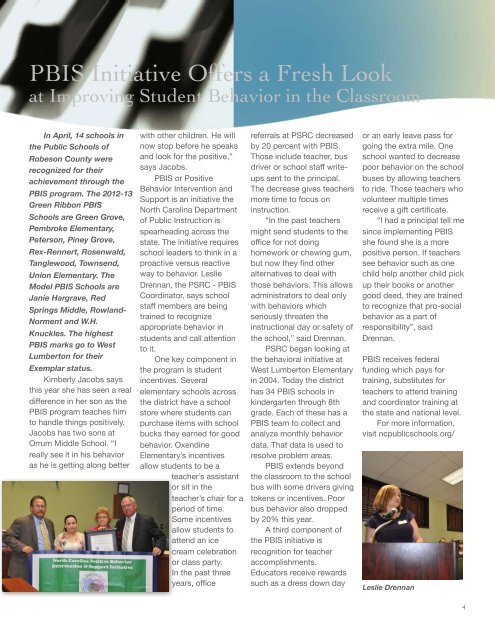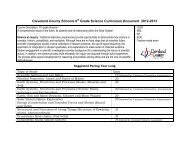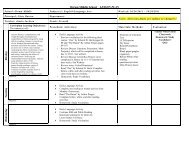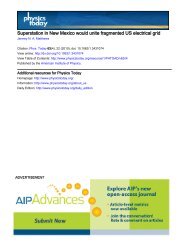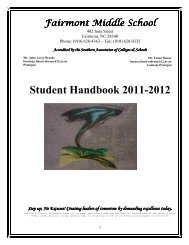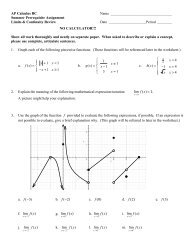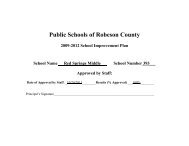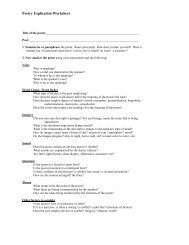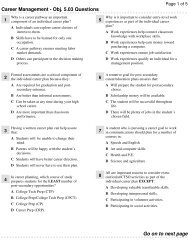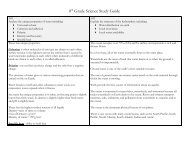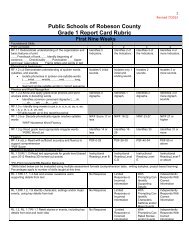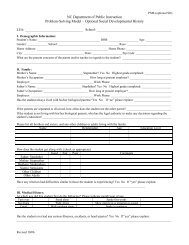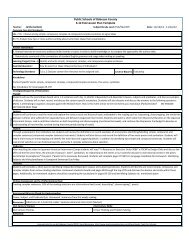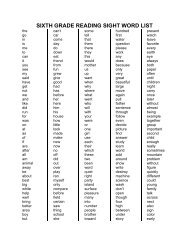Aware May Final July 22 - Public Schools of Robeson County
Aware May Final July 22 - Public Schools of Robeson County
Aware May Final July 22 - Public Schools of Robeson County
Create successful ePaper yourself
Turn your PDF publications into a flip-book with our unique Google optimized e-Paper software.
PBIS Initiative Offers a Fresh Look<br />
at Improving Student Behavior in the Classroom<br />
In April, 14 schools in<br />
the <strong>Public</strong> <strong>Schools</strong> <strong>of</strong><br />
<strong>Robeson</strong> <strong>County</strong> were<br />
recognized for their<br />
achievement through the<br />
PBIS program. The 2012-13<br />
Green Ribbon PBIS<br />
<strong>Schools</strong> are Green Grove,<br />
Pembroke Elementary,<br />
Peterson, Piney Grove,<br />
Rex-Rennert, Rosenwald,<br />
Tanglewood, Townsend,<br />
Union Elementary. The<br />
Model PBIS <strong>Schools</strong> are<br />
Janie Hargrave, Red<br />
Springs Middle, Rowland-<br />
Norment and W.H.<br />
Knuckles. The highest<br />
PBIS marks go to West<br />
Lumberton for their<br />
Exemplar status.<br />
Kimberly Jacobs says<br />
this year she has seen a real<br />
difference in her son as the<br />
PBIS program teaches him<br />
to handle things positively.<br />
Jacobs has two sons at<br />
Orrum Middle School. “I<br />
really see it in his behavior<br />
as he is getting along better<br />
with other children. He will<br />
now stop before he speaks<br />
and look for the positive,”<br />
says Jacobs.<br />
PBIS or Positive<br />
Behavior Intervention and<br />
Support is an initiative the<br />
North Carolina Department<br />
<strong>of</strong> <strong>Public</strong> Instruction is<br />
spearheading across the<br />
state. The initiative requires<br />
school leaders to think in a<br />
proactive versus reactive<br />
way to behavior. Leslie<br />
Drennan, the PSRC - PBIS<br />
Coordinator, says school<br />
staff members are being<br />
trained to recognize<br />
appropriate behavior in<br />
students and call attention<br />
to it.<br />
One key component in<br />
the program is student<br />
incentives. Several<br />
elementary schools across<br />
the district have a school<br />
store where students can<br />
purchase items with school<br />
bucks they earned for good<br />
behavior. Oxendine<br />
Elementary’s incentives<br />
allow students to be a<br />
teacher’s assistant<br />
or sit in the<br />
teacher’s chair for a<br />
period <strong>of</strong> time.<br />
Some incentives<br />
allow students to<br />
attend an ice<br />
cream celebration<br />
or class party.<br />
In the past three<br />
years, <strong>of</strong>fice<br />
referrals at PSRC decreased<br />
by 20 percent with PBIS.<br />
Those include teacher, bus<br />
driver or school staff writeups<br />
sent to the principal.<br />
The decrease gives teachers<br />
more time to focus on<br />
instruction.<br />
“In the past teachers<br />
might send students to the<br />
<strong>of</strong>fice for not doing<br />
homework or chewing gum,<br />
but now they find other<br />
alternatives to deal with<br />
those behaviors. This allows<br />
administrators to deal only<br />
with behaviors which<br />
seriously threaten the<br />
instructional day or safety <strong>of</strong><br />
the school,” said Drennan.<br />
PSRC began looking at<br />
the behavioral initiative at<br />
West Lumberton Elementary<br />
in 2004. Today the district<br />
has 34 PBIS schools in<br />
kindergarten through 8th<br />
grade. Each <strong>of</strong> these has a<br />
PBIS team to collect and<br />
analyze monthly behavior<br />
data. That data is used to<br />
resolve problem areas.<br />
PBIS extends beyond<br />
the classroom to the school<br />
bus with some drivers giving<br />
tokens or incentives. Poor<br />
bus behavior also dropped<br />
by 20% this year.<br />
A third component <strong>of</strong><br />
the PBIS initiative is<br />
recognition for teacher<br />
accomplishments.<br />
Educators receive rewards<br />
such as a dress down day<br />
or an early leave pass for<br />
going the extra mile. One<br />
school wanted to decrease<br />
poor behavior on the school<br />
buses by allowing teachers<br />
to ride. Those teachers who<br />
volunteer multiple times<br />
receive a gift certificate.<br />
“I had a principal tell me<br />
since implementing PBIS<br />
she found she is a more<br />
positive person. If teachers<br />
see behavior such as one<br />
child help another child pick<br />
up their books or another<br />
good deed, they are trained<br />
to recognize that pro-social<br />
behavior as a part <strong>of</strong><br />
responsibility”, said<br />
Drennan.<br />
PBIS receives federal<br />
funding which pays for<br />
training, substitutes for<br />
teachers to attend training<br />
and coordinator training at<br />
the state and national level.<br />
For more information,<br />
visit ncpublicschools.org/<br />
Leslie Drennan<br />
4


